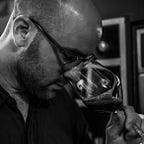The Night I Played a Cop
“What do I have to do?” I asked.
“So you’re gonna play a cop and you have to shoot my little brother,” my friend responded.
Three years ago, I was asked to play a cop on stage for the 35th annual African American Homecoming Pageant at Ohio State. The scene was easy to memorize and didn’t involve a lot of choreography. Just be a suspicious cop. Ask what these two black kids are doing. Then shoot the one trying to pick a fight with you. And run off.
This was post-Michael Brown, Eric Garner, Philando Castile, Alton Sterling and many other members of the black community who had lost their lives to police brutality. Before I got to the performance hall, I had dusty, heavy butterflies in my stomach. After, I wanted to throw up and cry.
The pageant took place on a Saturday. While my friends were bumping music and filling used solo cups with New Amsterdam vodka, I was getting changed into a police uniform fitted with a thick belt and convenient loops for my plastic baton and handcuffs, and holster for my water gun wrapped in black duct tape. I honestly looked like I was going to some orgy in the Short North.
The hall was packed with over five hundred black people. Me and the stagehand must’ve been the only white people at the event. I waited in the green room for us to be called onstage, while other participants warmed up their instruments, stretched, and read over their lines. A tall black man from the Alpha Phi Alpha fraternity was in the center of the room with his head tilted back, bleeding from the nose. Two drops of blood hit the glossy tile and glowed under the light bulbs.
I looked at the blood. I stared at it. Somebody wipe the fucking blood off the floor.
We stood offstage right before our turn to perform. I got to see the performers before us, maybe ten or so black students shut their eyes, looked down, and raised a fist into the air. The crowd roared.
Then we were up. I entered onto the stage with a hand on my plastic gun. A sea of voices booed and yelled at my character. After a choreographed grapple, a gunshot sound was cued and I ran offstage, while my victim lay dying in the arms of his brother.
Surprisingly, I felt the same rush of euphoria I get after every performance. Sure, I wasn’t the guy to root for, but the audience reacted and the story was told. But three years later, I am still thinking about those two drops of blood on the floor. In the moment, I thought we all bleed the same color, so why the tension? Why the inequality. Now all I think about is the blood. And how much of it has to be spilled on hot pavements before we can finally have an answer to, “What will I do today?”
Every time I see the George Floyd video, a part of me feels that I am the man with the knee on his neck. I didn’t vote in the local election. I didn’t change after years of murders. I didn’t bother to question rulings that deemed excessive force lawful. And by the time I wanted to change, the man under me had already stopped breathing. But if it took me this long to write this, it must mean I’m changing. Or that the pain I feel is much deeper than the time it’ll take me to forget. I’m not really sure what to do. Protest? Smash windows? Donate? Tweet my hate? Vote? My options feel tangible now, whereas before, it all felt better with an extra hour of sleep.
Playing a cop didn’t really teach me anything. I didn’t do that much research. It’s what I felt backstage that taught me the most. Listening in on conversations, watching black students express their pain, and feeling so fucking alienated from it all. But it all goes back to blood on the tile. Red. Just like mine. Holding the answer to what separates us: nothing.
